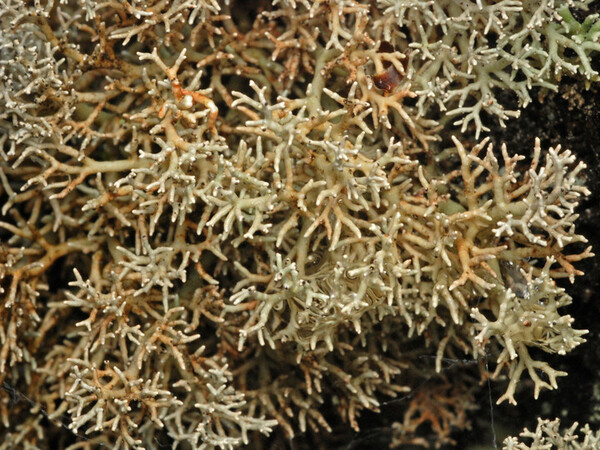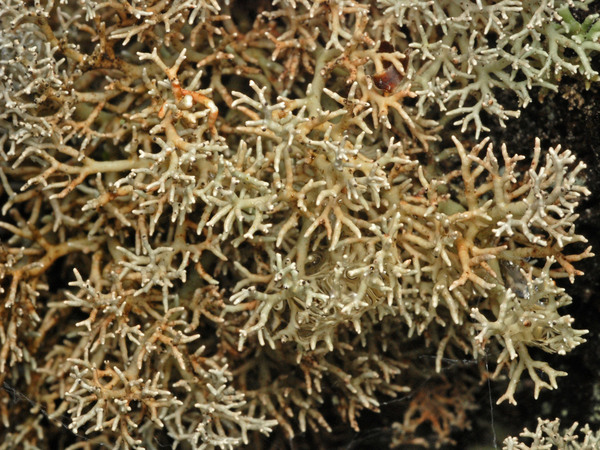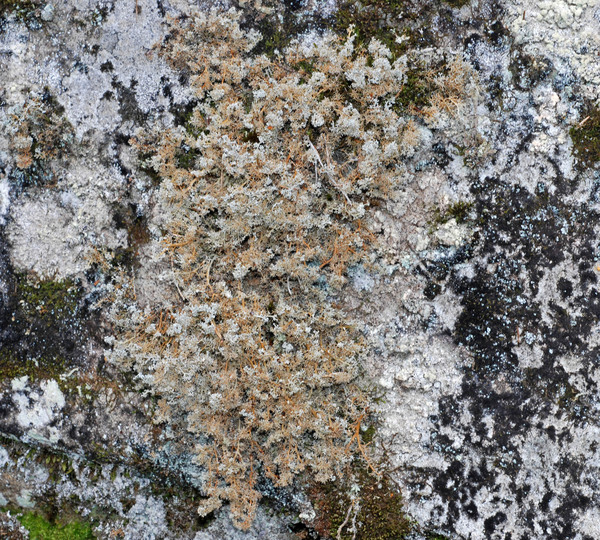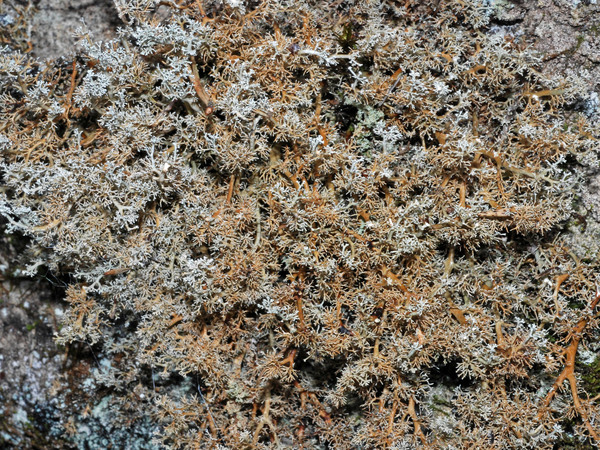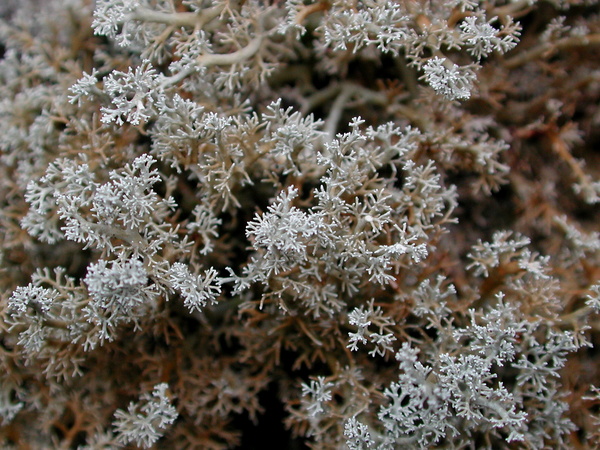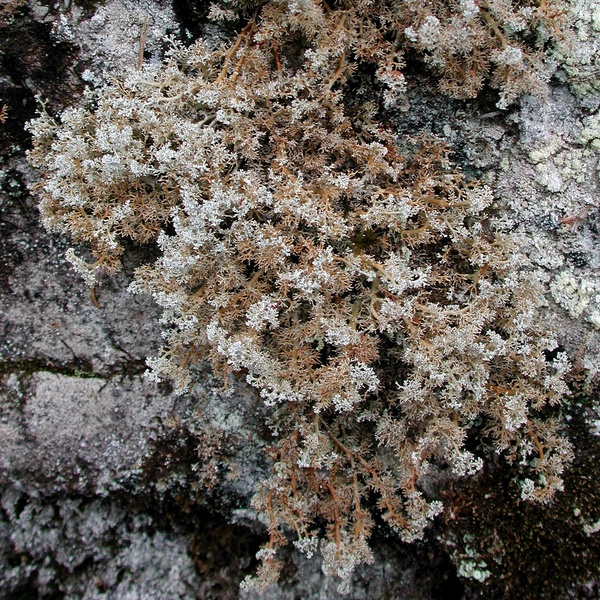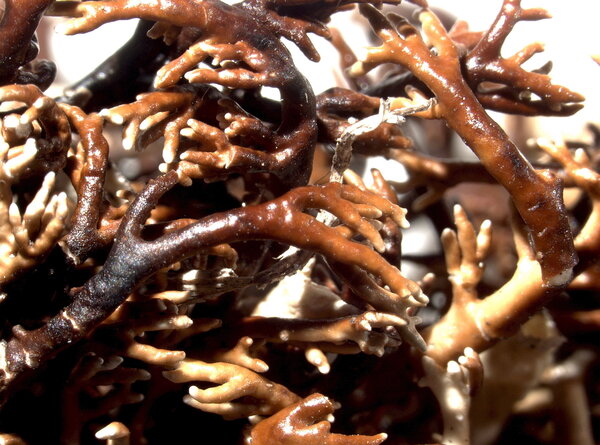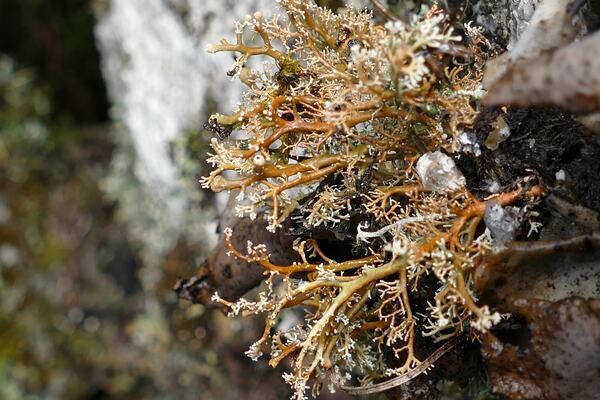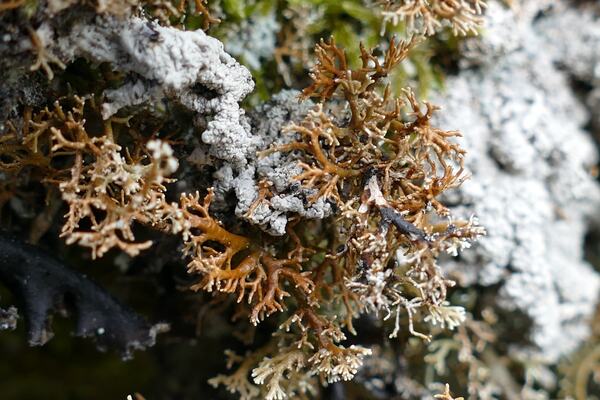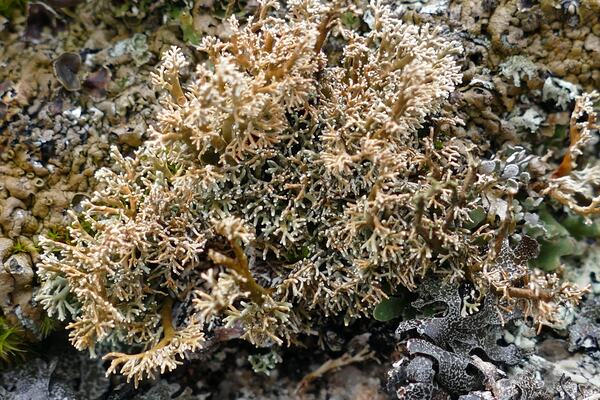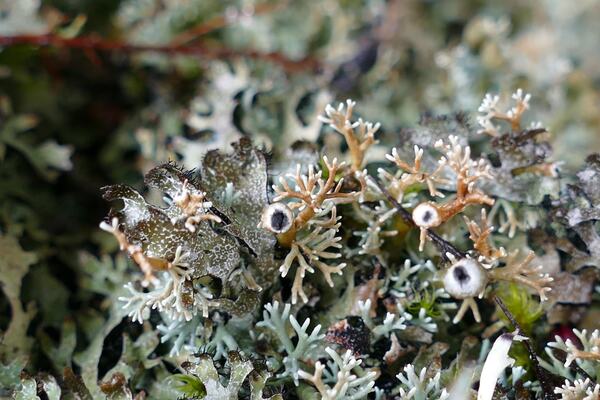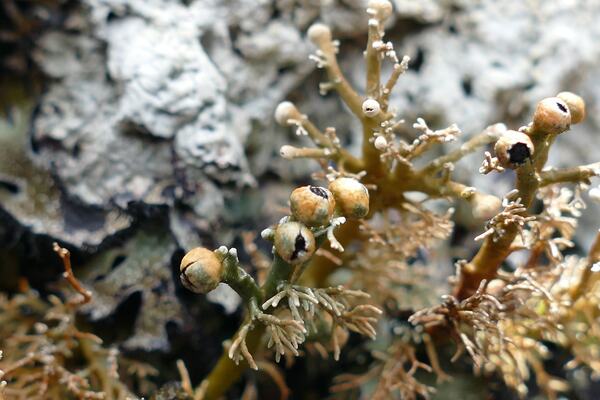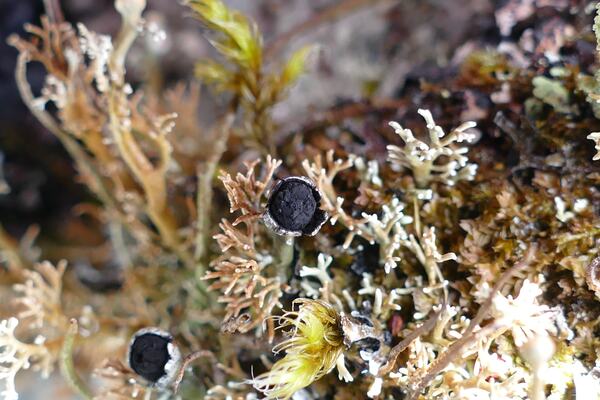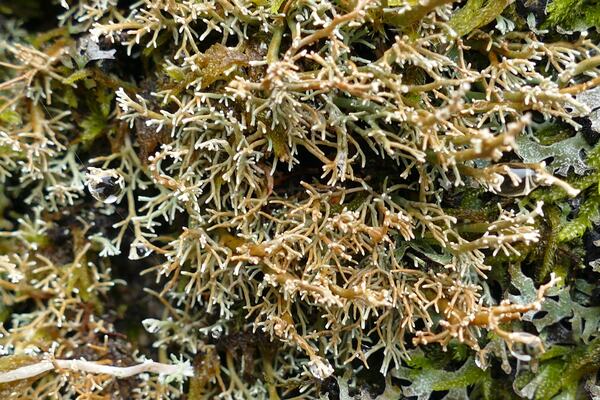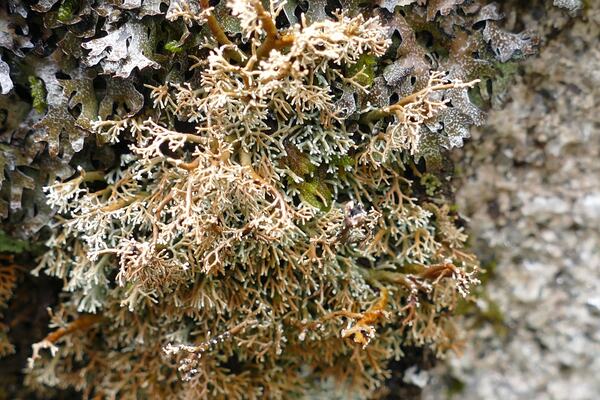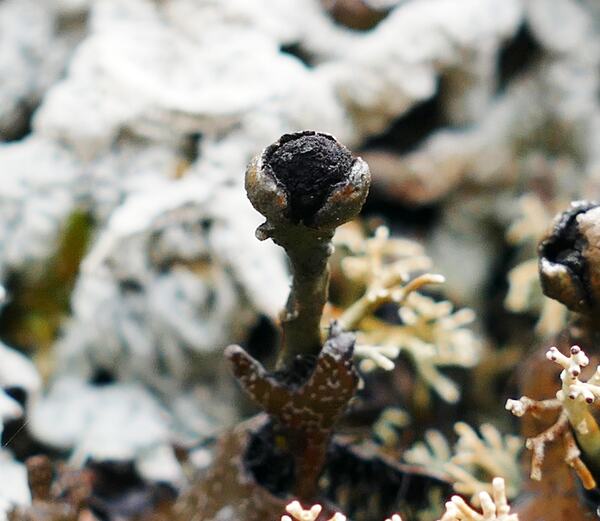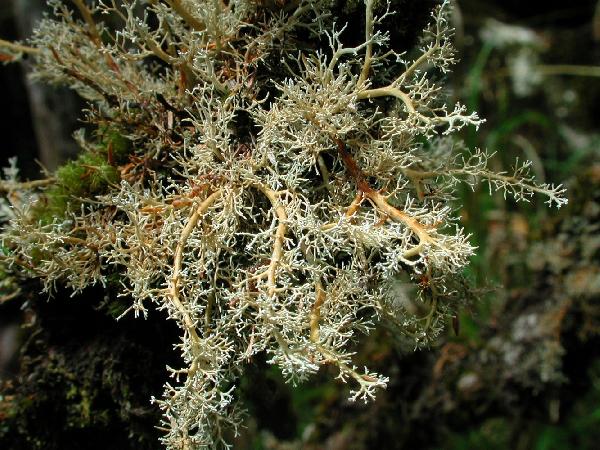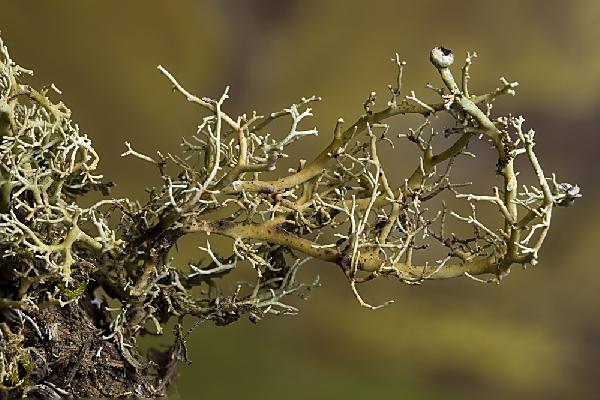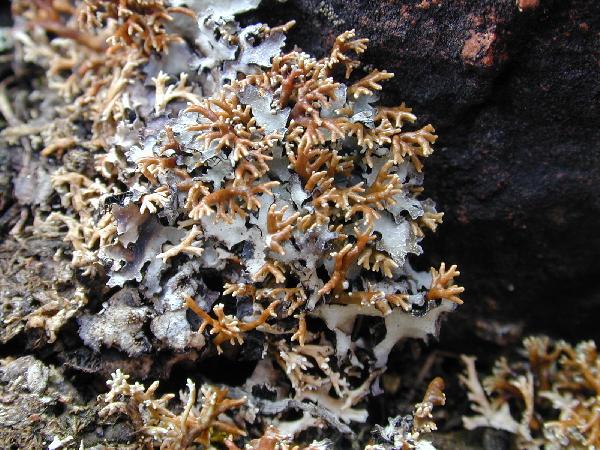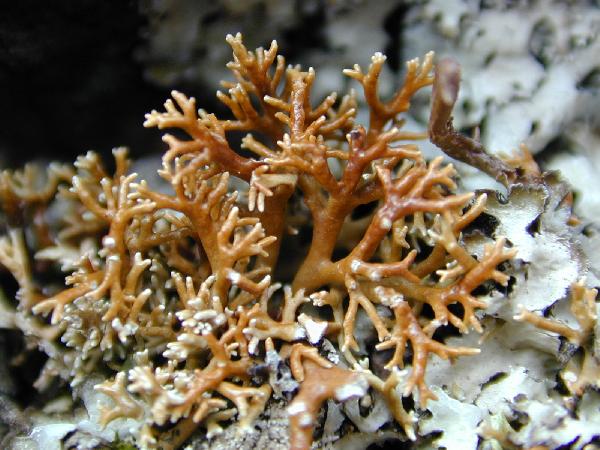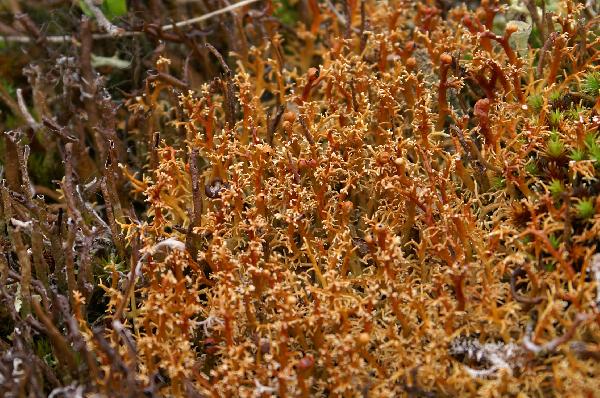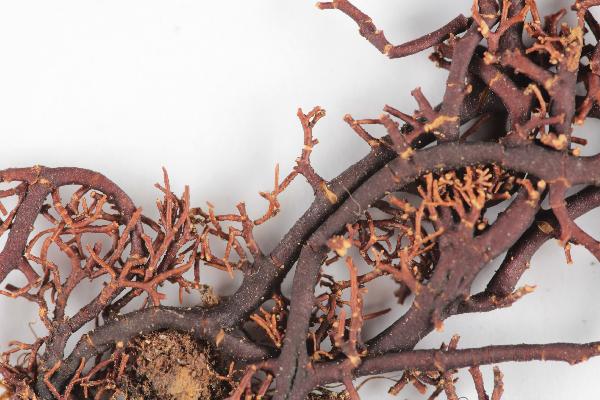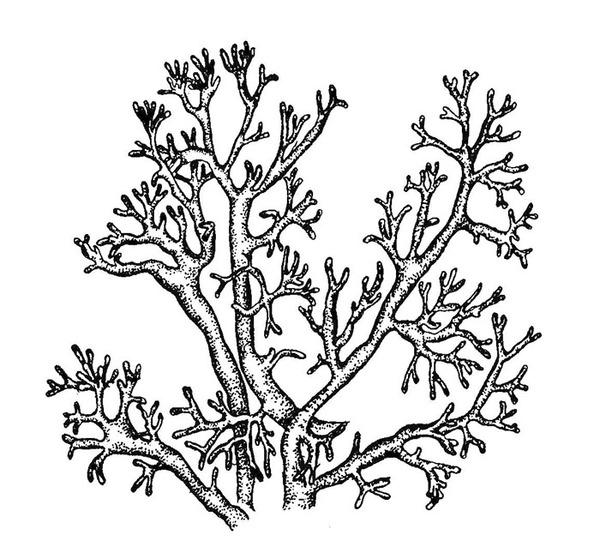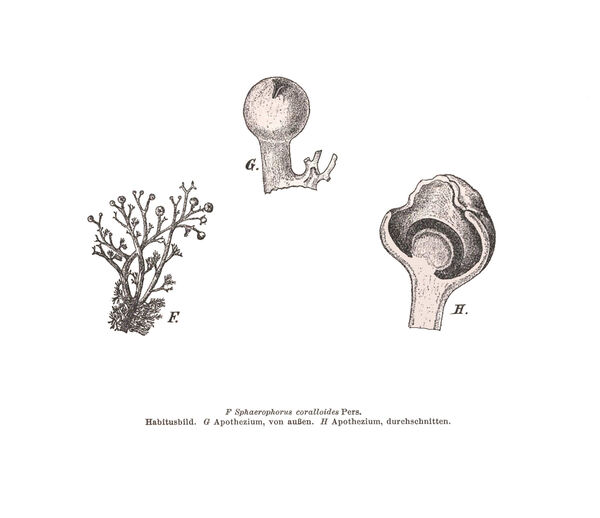Sphaerophorus globosus (Huds.) Vain.
Res. Voy. S. Y. Belgica, Bot.: 35, 1903. Basionym: Lichen globosus Huds. - Fl. Angl.: 460, 1762.
Synonyms: Sphaerophorus coralloides Pers.; Sphaerophorus globiferus (L.) DC.
Distribution: N - Ven (Puntillo & Puntillo 2009), TAA (Nascimbene & al. 2006e, 2007b, Puntillo & Puntillo 2009), Lomb (Puntillo & Puntillo 2009), Piem (Isocrono & al. 2004, Puntillo & Puntillo 2009), VA (Puntillo & Puntillo 2009), Emil (Brunialti & al. 2001, Puntillo & Puntillo 2009, Fariselli & al. 2020). C - Tosc (Puntillo & Puntillo 2009), Sar (Puntillo & Puntillo 2009). S - Camp (Ravera & al. 2020b), Bas (Puntillo & al. 2012), Cal (Puntillo 1994, 1996, Puntillo & Puntillo 2009).
Description: Thallus fruticose, shrubby-coralloid, grey to brown, the apices often paler, 3-7(-15) cm tall, more or less erect, forming small to large cushions (up to 15 cm across), often richly but loosely and irregularly branched. Main branches terete, erect to decumbent, occasionally becoming pendent, rather coarse, 0.5-1 mm thick, often white-maculate; secondary branches with frequent lateral branching and numerous slender, coralloid branchlets. Surface smooth, generally dull to glossy and maculate, occasionally transversely cracked. Cortex of thick-walled, gelatinized hyphae running in various directions, covered by a thin epicortex; medulla of longitudinally arranged, thick-walled hyphae, I+ dark blue (reaction often faint in old herbarium specimens). Apothecia rare, 1.2-1.8 mm across, terminal, globose, at first immersed in swollen, stalked apices, soon bursting apically to expose a dry mass of black ascospores (mazaedium), surrounded by a torn thalline exciple. Proper exciple thin, poorly evident; epithecium soon disintegrating, brown to green, N+ red; paraphyses thread-like, strongly carbonized, soon disintegrating; hypothecium brown-black. Asci 8-spored, soon disintegrating, cylindrical, unitunicate, thin-walled, formed singly from ascogenous hyphae with croziers, Calicium-type, with uniseriately arranged spores. Ascospores 1-celled, at first greenish, then dark violet to finally blue-black, subglobose to broadly ellipsoid, (5-)7-10(-12) x 7-11 µm, with a dark, irregular ornamentation. Pycnidia rare, terminal, semi-immersed. Conidia 1-celled, hyaline, ellipsoid to obovate, 3-5 x 1-2 µm. Spot tests: cortex K-, C-, KC-, P-; medulla K- or K+ yellow, KC-, C-, P- or P+ yellow, UV+ blue-white, I+ blue. Chemistry: sphaerophorin, and variable amounts of thamnolic, squamatic, and hypothamnolic acids in different combinations.Note: restricted to cold-humid areas, mostly on rocks, very rarely (in Italy) at the base of old boles in natural forests, probably extinct in several regions. Earlier records from Sicily, not validated by Puntillo & Puntillo (2009), are excluded. For further information see Högnabba & Wedin (2003). It is included in the Italian red list of epiphytic lichens as “Vulnerable” (Nascimbene & al. 2013c).
Growth form: Fruticose
Photobiont: green algae other than Trentepohlia
Reproductive strategy: mainly sexual
Most common in areas with a humid-warm climate (e.g. most of Tyrrenian Italy)
Commonnes-rarity: (info)
Alpine belt: absent
Subalpine belt: extremely rare
Oromediterranean belt: absent
Montane belt: very rare
Submediterranean belt: absent
Padanian area: absent
Humid submediterranean belt: absent
Humid mediterranean belt: absent
Dry mediterranean belt: absent
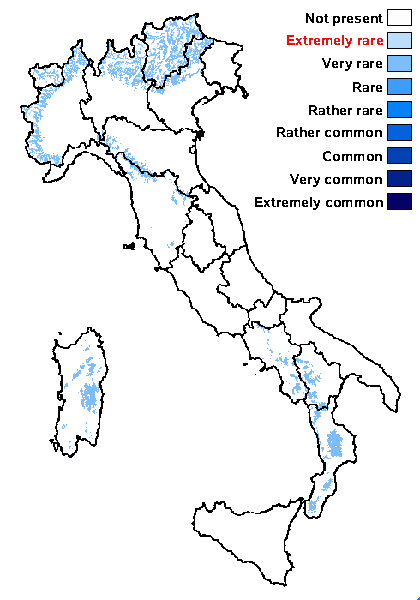
Predictive model
Herbarium samples
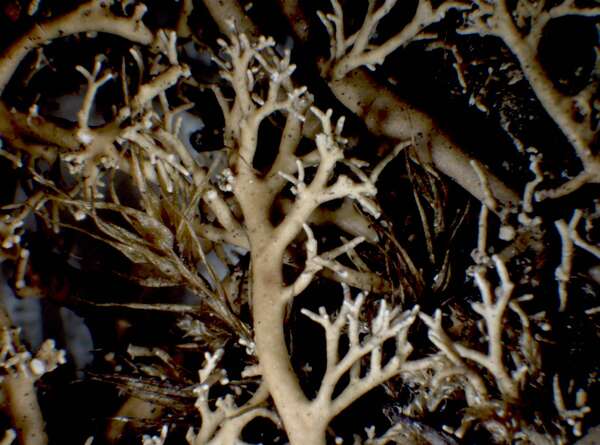

P.L. Nimis; Owner: Department of Life Sciences, University of Trieste
Herbarium: TSB (3225)
2001/11/30
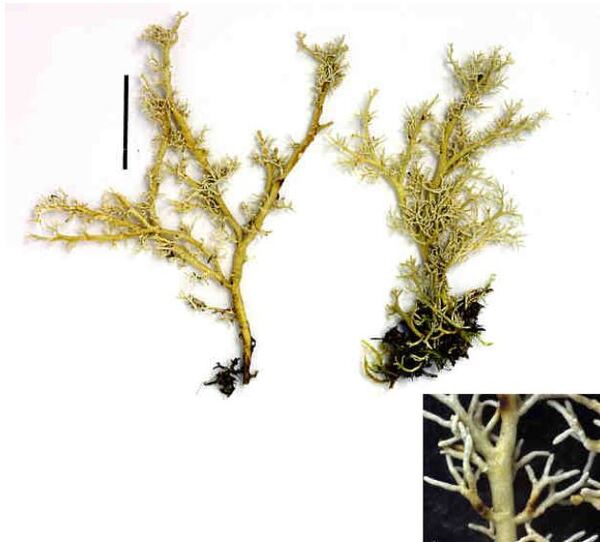

Felix Schumm – CC BY-SA 4.0
Image from: F. Schumm (2008) - Flechten Madeiras, der Kanaren und Azoren. Beck, OHG - ISBN: 978-3-00-023700-3
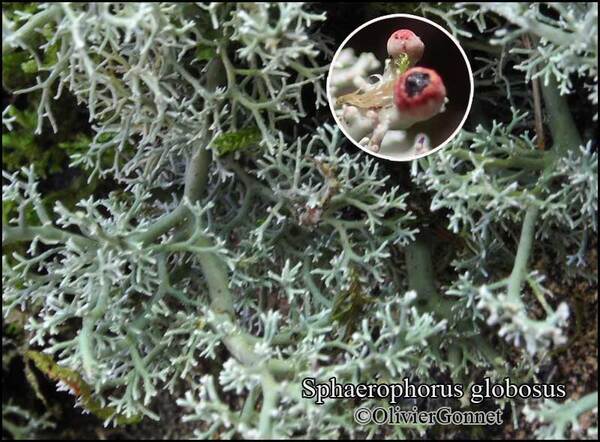
Courtesy Danièle et Olivier Gonnet - Source: https://www.afl-lichenologie.fr/Photos_AFL/Photos_AFL_S/Sphaerophorus_globosus.htm
France, session AFL 2013 dans le Forez - Puy-de-Dôme
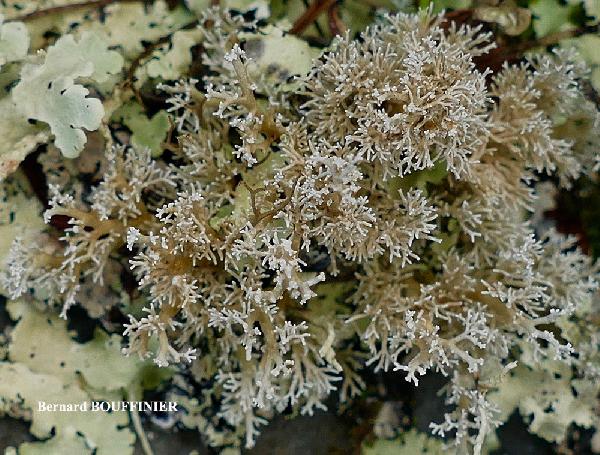
Bernard Bouffinier - Source: http://www.lichensmaritimes.org/index.php?task=fiche&lichen=247&lang=en
France, Cap de la Chèvre
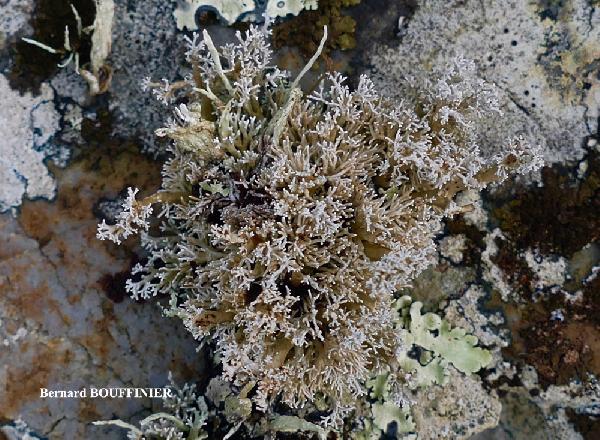
Bernard Bouffinier - Source: http://www.lichensmaritimes.org/index.php?task=fiche&lichen=247&lang=en
France, Cap de la Chèvre
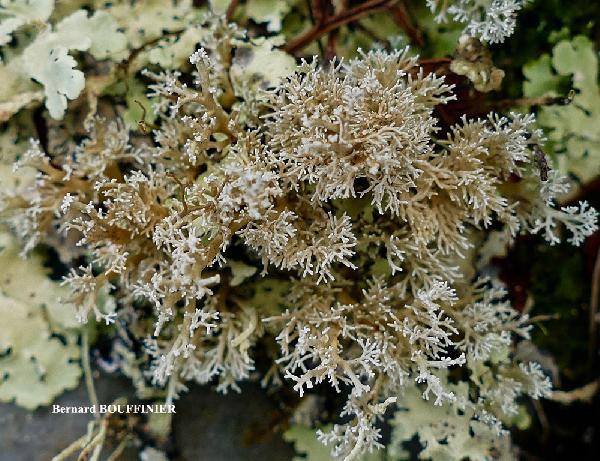
Bernard Bouffinier - Source: http://www.lichensmaritimes.org/index.php?task=fiche&lichen=247&lang=en
France, Cap de la Chèvre
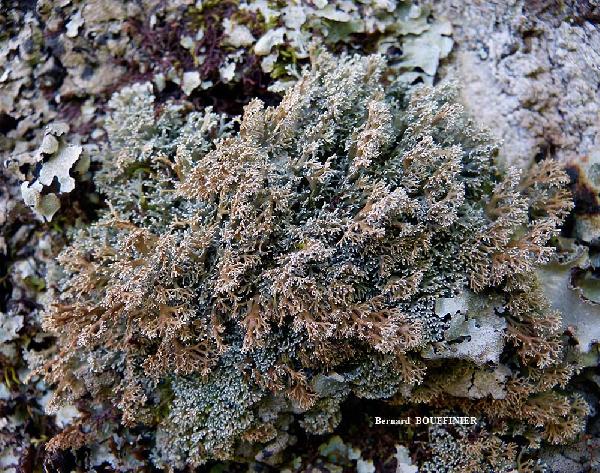
Bernard Bouffinier - Source: http://www.lichensmaritimes.org/index.php?task=fiche&lichen=247&lang=en
France, Iraty
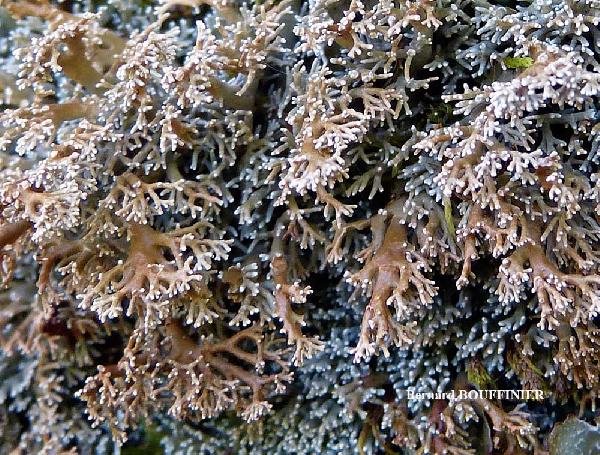
Bernard Bouffinier - Source: http://www.lichensmaritimes.org/index.php?task=fiche&lichen=247&lang=en
France, Iraty
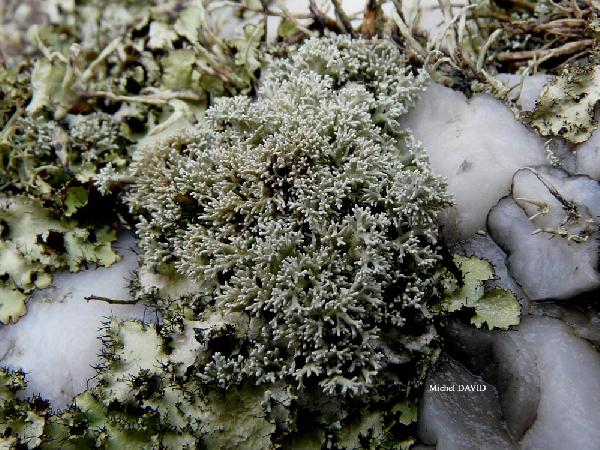
Michel David - Source: http://www.lichensmaritimes.org/index.php?task=fiche&lichen=247&lang=en
France, Cap de la Chèvre
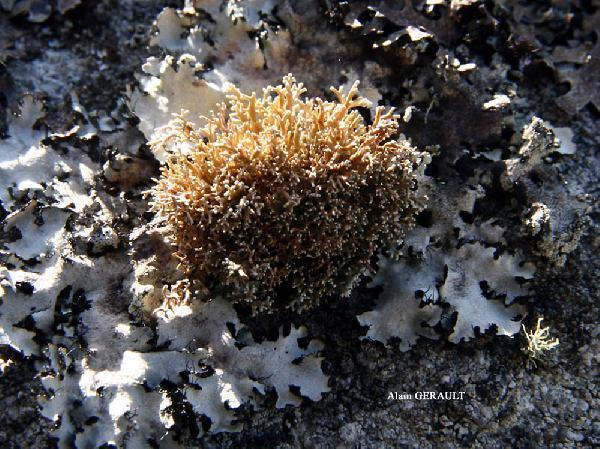
Alain Gerault - Source: http://www.lichensmaritimes.org/index.php?task=fiche&lichen=247&lang=en
France, Pointe du Raz
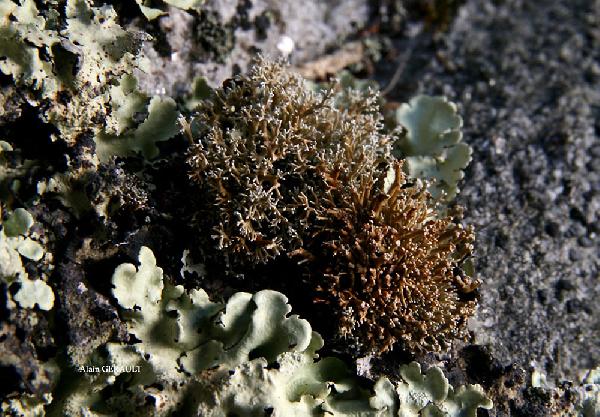
Alain Gerault - Source: http://www.lichensmaritimes.org/index.php?task=fiche&lichen=247&lang=en
France, Pointe du Raz
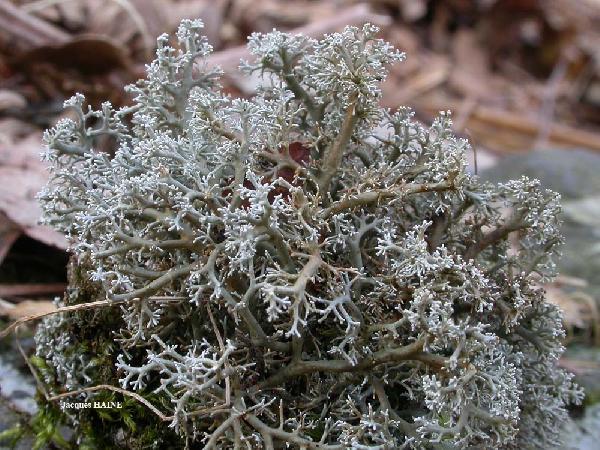
Jacques Haine - Source: http://www.lichensmaritimes.org/index.php?task=fiche&lichen=247&lang=en
Belgium, Monthermé
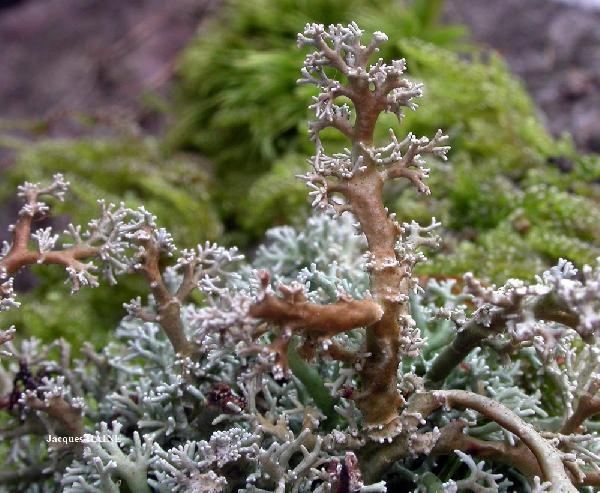
Jacques Haine - Source: http://www.lichensmaritimes.org/index.php?task=fiche&lichen=247&lang=en
Belgium, Monthermé
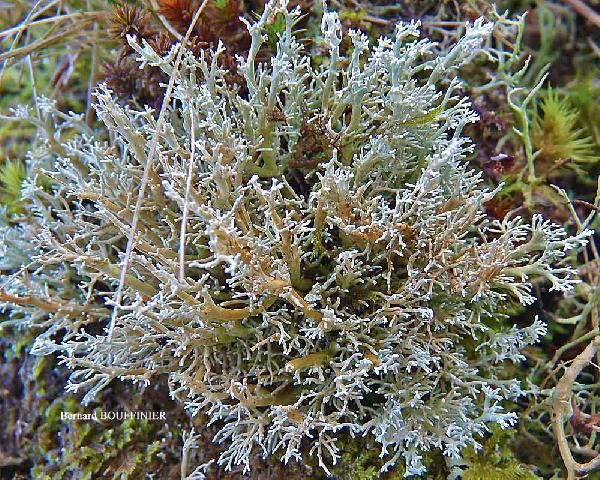
Bernard Bouffinier - Source: http://www.lichensmaritimes.org/index.php?task=fiche&lichen=247&lang=en
France, Roc'h Trévézel
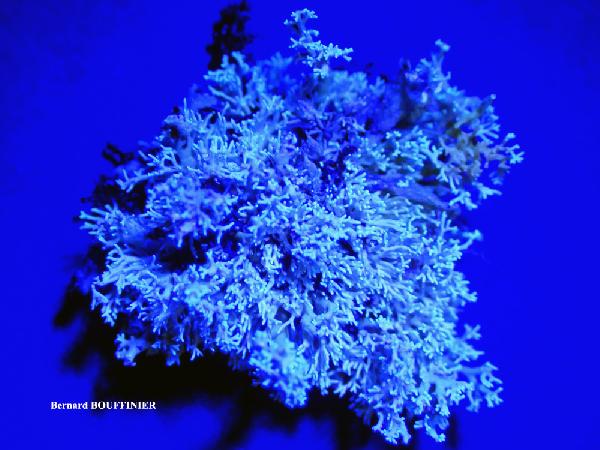
Bernard Bouffinier - Source: http://www.lichensmaritimes.org/index.php?task=fiche&lichen=247&lang=en
France, Cap de la Chèvre
UV+
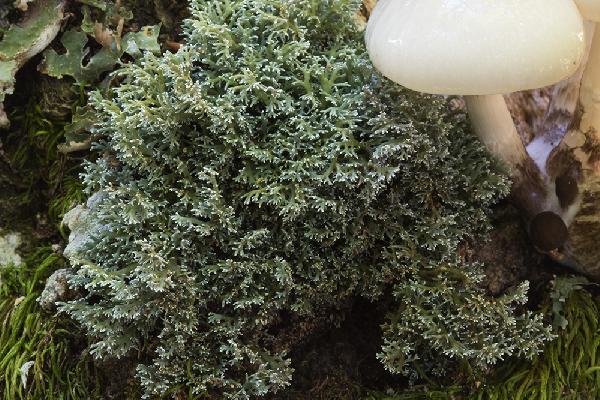
Marta González Garcia - Centro de Estudios Micologicos Asturianos
Hayedo del Pico la Cotorra, Soto de Sajambre (León), 10-X-2021, 1.400 m de altitud, ERD-9145, en madera de Fagus sylvatica.
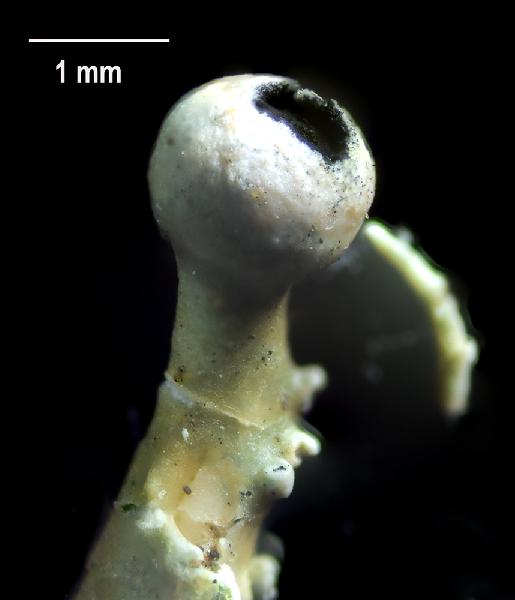
Marta González Garcia - Centro de Estudios Micologicos Asturianos
Hayedo del Pico la Cotorra, Soto de Sajambre (León), 10-X-2021, 1.400 m de altitud, ERD-9145, en madera de Fagus sylvatica.
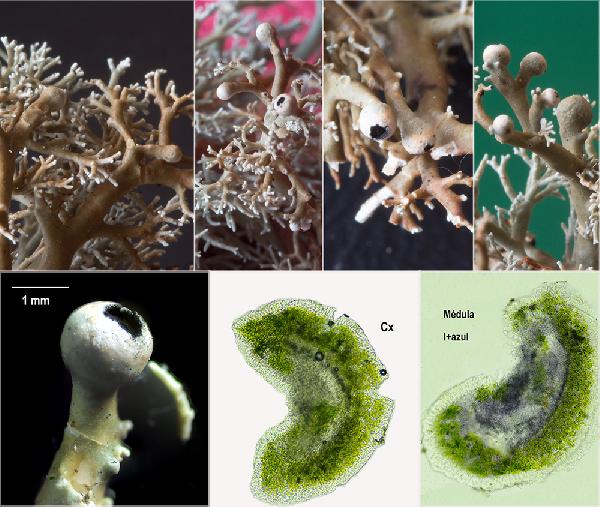
Marta González Garcia - Centro de Estudios Micologicos Asturianos
Hayedo del Pico la Cotorra, Soto de Sajambre (León), 10-X-2021, 1.400 m de altitud, ERD-9145, en madera de Fagus sylvatica.
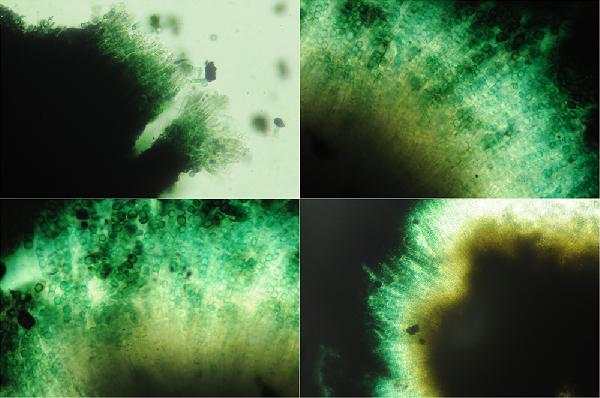
Marta González Garcia - Centro de Estudios Micologicos Asturianos
Hayedo del Pico la Cotorra, Soto de Sajambre (León), 10-X-2021, 1.400 m de altitud, ERD-9145, en madera de Fagus sylvatica.
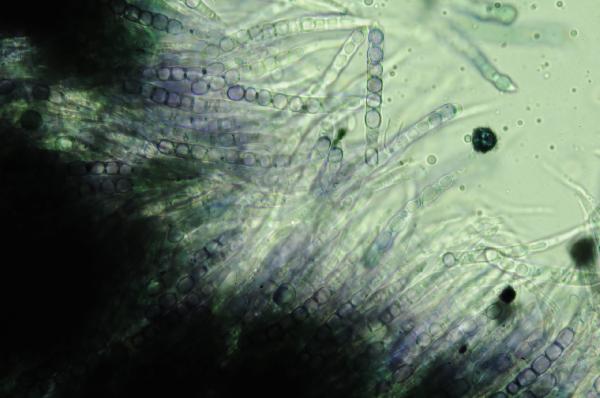
Marta González Garcia - Centro de Estudios Micologicos Asturianos
Hayedo del Pico la Cotorra, Soto de Sajambre (León), 10-X-2021, 1.400 m de altitud, ERD-9145, en madera de Fagus sylvatica.
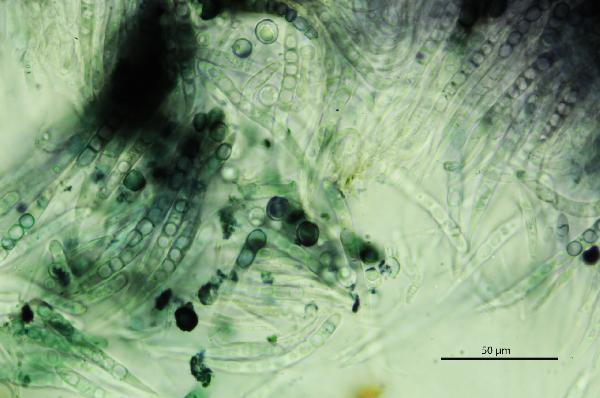
Marta González Garcia - Centro de Estudios Micologicos Asturianos
Hayedo del Pico la Cotorra, Soto de Sajambre (León), 10-X-2021, 1.400 m de altitud, ERD-9145, en madera de Fagus sylvatica.
Growth form: Fruticose
Photobiont: green algae other than Trentepohlia
Reproductive strategy: mainly sexual
Most common in areas with a humid-warm climate (e.g. most of Tyrrenian Italy)
Commonnes-rarity: (info)
Alpine belt: absent
Subalpine belt: extremely rare
Oromediterranean belt: absent
Montane belt: very rare
Submediterranean belt: absent
Padanian area: absent
Humid submediterranean belt: absent
Humid mediterranean belt: absent
Dry mediterranean belt: absent

Predictive model
| Herbarium samples |


P.L. Nimis; Owner: Department of Life Sciences, University of Trieste
Herbarium: TSB (3225)
2001/11/30


Felix Schumm – CC BY-SA 4.0
Image from: F. Schumm (2008) - Flechten Madeiras, der Kanaren und Azoren. Beck, OHG - ISBN: 978-3-00-023700-3

Courtesy Danièle et Olivier Gonnet - Source: https://www.afl-lichenologie.fr/Photos_AFL/Photos_AFL_S/Sphaerophorus_globosus.htm
France, session AFL 2013 dans le Forez - Puy-de-Dôme

Bernard Bouffinier - Source: http://www.lichensmaritimes.org/index.php?task=fiche&lichen=247&lang=en
France, Cap de la Chèvre

Bernard Bouffinier - Source: http://www.lichensmaritimes.org/index.php?task=fiche&lichen=247&lang=en
France, Cap de la Chèvre

Bernard Bouffinier - Source: http://www.lichensmaritimes.org/index.php?task=fiche&lichen=247&lang=en
France, Cap de la Chèvre

Bernard Bouffinier - Source: http://www.lichensmaritimes.org/index.php?task=fiche&lichen=247&lang=en
France, Iraty

Bernard Bouffinier - Source: http://www.lichensmaritimes.org/index.php?task=fiche&lichen=247&lang=en
France, Iraty

Michel David - Source: http://www.lichensmaritimes.org/index.php?task=fiche&lichen=247&lang=en
France, Cap de la Chèvre

Alain Gerault - Source: http://www.lichensmaritimes.org/index.php?task=fiche&lichen=247&lang=en
France, Pointe du Raz

Alain Gerault - Source: http://www.lichensmaritimes.org/index.php?task=fiche&lichen=247&lang=en
France, Pointe du Raz

Jacques Haine - Source: http://www.lichensmaritimes.org/index.php?task=fiche&lichen=247&lang=en
Belgium, Monthermé

Jacques Haine - Source: http://www.lichensmaritimes.org/index.php?task=fiche&lichen=247&lang=en
Belgium, Monthermé

Bernard Bouffinier - Source: http://www.lichensmaritimes.org/index.php?task=fiche&lichen=247&lang=en
France, Roc'h Trévézel

Bernard Bouffinier - Source: http://www.lichensmaritimes.org/index.php?task=fiche&lichen=247&lang=en
France, Cap de la Chèvre
UV+

Marta González Garcia - Centro de Estudios Micologicos Asturianos
Hayedo del Pico la Cotorra, Soto de Sajambre (León), 10-X-2021, 1.400 m de altitud, ERD-9145, en madera de Fagus sylvatica.

Marta González Garcia - Centro de Estudios Micologicos Asturianos
Hayedo del Pico la Cotorra, Soto de Sajambre (León), 10-X-2021, 1.400 m de altitud, ERD-9145, en madera de Fagus sylvatica.

Marta González Garcia - Centro de Estudios Micologicos Asturianos
Hayedo del Pico la Cotorra, Soto de Sajambre (León), 10-X-2021, 1.400 m de altitud, ERD-9145, en madera de Fagus sylvatica.

Marta González Garcia - Centro de Estudios Micologicos Asturianos
Hayedo del Pico la Cotorra, Soto de Sajambre (León), 10-X-2021, 1.400 m de altitud, ERD-9145, en madera de Fagus sylvatica.

Marta González Garcia - Centro de Estudios Micologicos Asturianos
Hayedo del Pico la Cotorra, Soto de Sajambre (León), 10-X-2021, 1.400 m de altitud, ERD-9145, en madera de Fagus sylvatica.

 INDEX FUNGORUM
INDEX FUNGORUM
 GBIF
GBIF
 DOLICHENS
DOLICHENS
